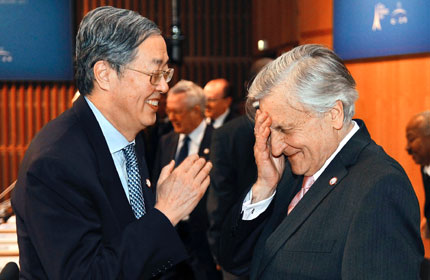G20 settles for compromise in deal
|
|
|
European Central Bank President Jean Claude Trichet (right) gestures as he talks with China's central bank Governor Zhou Xiaochuan at the opening of the G20 finance summit in Paris on Saturday. Finance chiefs from the world's 20 industrialized and fastest developing nations discuss the world economy at the two-day meeting. |
The world's dominant economies struck a watered down deal on how to smooth out trade and currency imbalances many say exacerbated the financial crisis, but the difficulty in getting vastly different economies like China and the United States on the same page doesn't bode well for the Group of 20 rich and developing countries.
G20 finance ministers anwd central bankers meeting in Paris agreed on Saturday on a list of technical indicators to track those imbalances - caused by some countries consuming more while others tend to hold on to their money - but left the more tricky questions of when those imbalances actually become dangerous and what to do to mitigate them for later.
French Finance Minister Christine Lagarde, whose country holds the G20 presidency this year, said the all-night talks had been "tense" at times, indicating the clash in national interests between countries that find themselves on completely divergent growth trajectories after the 2008 financial crisis that plunged the world into its worst economic recession in 70 years.
The result was a "balanced compromise (that) doesn't stigmatize any one country," Lagarde told journalists.
The G20 itself is a recognition of the rise to power of nations such as India, China and Brazil, having supplanted smaller forums like the G7 and G8 during the climax of the financial crisis, when it achieved its biggest successes.
But since then with some countries growing at an almost unprecedented pace while others remain in the trough of recession the G20 has lost much of its swagger.
At the heart of the debate about imbalances is the realization that a decades-long global economic order centered on the US buying exports from the rest of the world and running huge trade deficits, while countries such as Germany accumulate vast surpluses, is no longer tenable.
In the years before the meltdown, countries with trade surpluses plowed money into mortgage and other investments in the US, driving up their value and exacerbating the crash when the bubble eventually burst.
But the opaque language of Saturday's deal shows the challenge of moving beyond that basic recognition.
Compromise wording was agreed on making that measurement a mix of current account balance - the indicator most countries wanted - and trade balance, the yardstick China had been pushing for.
The valuation of national currencies - long a sticking point in Chinese-US relations - did not survive as a separate indicator, but will be considered as part of the broader analysis of capital flows.
Foreign currency reserves were dropped all together, although some officials insisted they survived under the oblique heading of "other policies."
Lagarde touted the very fact the words "exchange rate" were even mentioned on the list as a success. The indicators also include more traditional yardsticks such as public debt, deficits, private debt levels and savings rates.
 0
0 








Go to Forum >>0 Comments